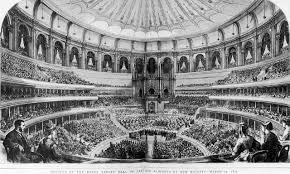
Introduction
The Royal Albert Hall, one of the most iconic venues in London, stands as a testament to the city’s rich cultural heritage. Completed in 1871, this magnificent concert hall has played host to countless performances across a wide range of artistic disciplines, making it a pivotal hub for music, dance, and theatre. Its significance in the UK’s cultural landscape cannot be overstated, as it not only showcases international talent but also supports local artists and educates young performers.
Historical Significance
The hall was opened by Queen Victoria in memory of her husband, Prince Albert, and has been at the forefront of musical innovation and excellence ever since. It has a seating capacity of 5,272 and features an impressive circular design, making it a unique architectural marvel. Decorated with intricate mosaics and carvings, the hall’s aesthetic appeal complements its acoustical design, which is renowned for being one of the best in the world.
Recent Events
As of late 2023, the Royal Albert Hall has been bustling with activity following the relaxation of COVID-19 restrictions, which had previously limited capacity and event schedules. This season has seen a wide array of performances, including classical concerts, rock gigs, and even contemporary art events. Notable performances included the London Philharmonic Orchestra’s annual series and the famous BBC Proms, drawing in lovers of classical music from across the globe. Additionally, the venue has been increasingly hosting crossover genres, blending classical performances with modern pop and electronic music, appealing to a broader audience.
Upcoming Highlights
Looking ahead, the Royal Albert Hall is scheduled to hold a series of exciting events throughout 2024, including performances by renowned artists and collaborations with international symphonic ensembles. Events such as ‘Classic Carols’ around the festive season and family-friendly performances aim to draw in younger generations to experience live music. Furthermore, the hall is working on a series of educational workshops and outreach programmes, which highlight its commitment to fostering musical talent and engaging with the community.
Conclusion
The Royal Albert Hall remains a cornerstone of London’s artistic community, reflecting the city’s vibrant cultural identity. Its rich history, diverse programming, and commitment to education ensure that it continues to be a vital cultural landmark. As we look to the future, the ongoing evolution of its events promises to entertain and inspire audiences for generations to come, reaffirming its status as a global symbol of live performance.
You may also like

The Importance of Pubs in British Society and Their Resurgence

The Cultural and Historical Significance of Poppies
